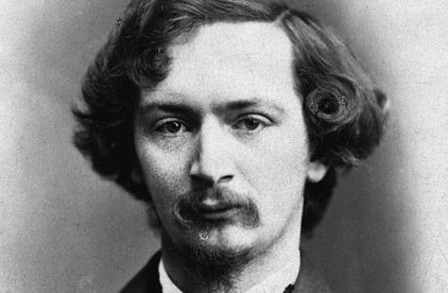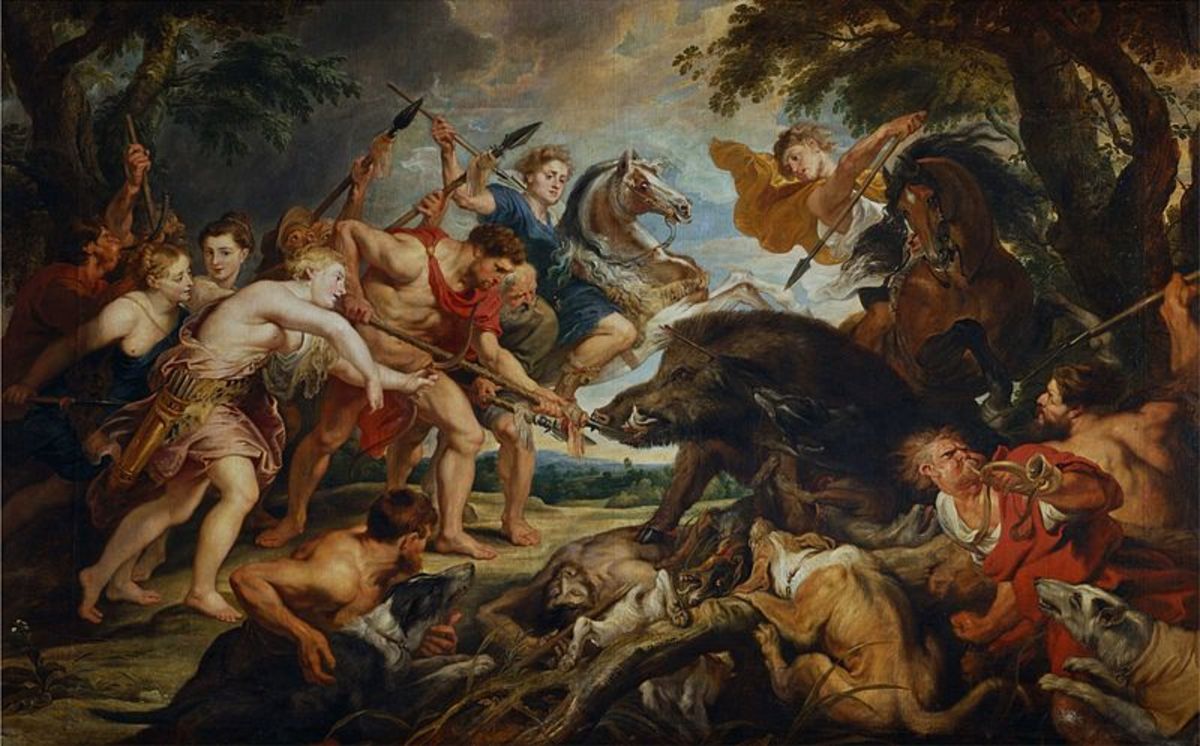Friday, August 4, 2017
Algernon Charles Swinburne--Atalanta in Calydon (1865)
This was my first time ever reading anything by Swinburne. It was not the best time for this, as my summer days now are very busy and there are a lot of demands on my time that are not there when everyone goes back to school. At night when everyone finally goes to bed I am too tired to concentrate well on a Victorian poet, who, if not exactly difficult ("difficult"), often writes very lengthy stanzas and discourses and requires, like Browning, practice in figuring out how to read him properly, which attainment I cannot claim to have reached on this occasion. In each of the last two summers, at least, I happened to be occupied for this list by very long novels, which I think is preferable for me in this season at the current time, since it is possible to read 10 or 15 pages of most of them even when I am a little tired, and I can always feel like I am 'making progress' with the book. Making progress does not apply in the same way with Swinburne-type poetry if you are not engaging intimately with its essential character and strengths. In short, my experience with this book was somewhat unsuccessful.
Thinking about this poem, or poetic drama, though I don't think it was ever intended to be performed, I keep coming back to the perception I had that it was strange, in the sense that I kept getting slightly thrown off both from my original expectations of what was going on in it and from the initial adjustments I made in those. It is prefaced by four pages of verse in Greek, apparently written by Swinburne himself, which, even though there was a translation of it in the footnotes, I felt obligated because it had been printed in my book to try to read through and make out any meanings I could, which mainly had the effect of making me irritable before I even got to the poem proper. Then I was thrown off again at realizing that the Atalanta story that was the subject of the poem was not the one involving the footrace with the suitors, but that of a hunt for a wild boar that was terrorizing the kingdom of Calydon. After that it was the slow realization that Atalanta herself only had a minor role in the drama and that Queen Alathea was the main character. Then there were the what seemed to me exceptionally long speeches with their digressions about emotions and other rather general concepts, and after that the realization that this was not a traditionally action-driven story, that the buildup we were heading for was not so much a series of events but of characters making long speeches about events that have taken place while the chorus was pontificating about the ways of the gods. None of this means that I didn't like it--I did at times, when I could keep up with the flow of words and construct meanings and images out of them, but for the most part that did not happen. So I am reserving judgment for the time being. I hope it comes up on my GRE/"A" list sometime, which it may. I think I would get more out of it if I could read it again at some remove of time.
Recalling that Swinburne was held in some regard by Joyce, Eliot, and others of the modernist generation of authors, I thought I would look into my Ezra Pound book to see what he had to say about him. There wasn't much that struck me. He did say that Swinburne was possessed of genius, which in Pound is a compliment though more in the sense that there is something in him that is not completely stifling and banal. It doesn't necessarily indicate that any successful poems were ultimately achieved. He also wrote that in Swinburne's early poems he expressed a love of liberty "that was rare in England". He said what I have often seen written of Swinburne, that his language was beautiful even when his thought was pedestrian, though as I have already noted I was not able to pick up on this. My mind was off.
There are not a ton of editions of this readily available even online. I guess there is a Penguin edition that gets reprinted pretty regularly, which perhaps I should have gotten. I bought a hardcover published in 1970 by Bobbs-Merrill containing the Poems and Ballads as well as Atalanta, edited by Professor Morse Peckham of the University of South Carolina. Peckham was a gassy writer marinated in the kind of Freudian worldview popular at the time for which I was not really ready either. I guess he must have had some idea of what he was talking about with regard to Swinburne's poetry, but I don't really trust him all that much either. The author of other books such as Man's Rage For Chaos and Art and Pornography, he took a great relish in writing about Swinburne's odd psychosexual issues. "Swinburne was an active masochist; he could achieve sexual pleasure only through suffering, specifically through being beaten" he begins, and goes on and on and on...I do not have it for this book, as least as far as writing about it goes. I need to move on to the next one.
The Challenge
I knew this would be another small one, as the write-up on it from which I mine words is very short.
1. Marlo Thomas & Friends--Free to Be You and Me..........................................396
2. Silent House (movie).........................................................................................200
3. Van Morrison--Veedon Fleece (record).............................................................100
4. Bruce Chatwin--The Songlines..........................................................................100
5. Antjie Krog--Country of My Skull.......................................................................31
6. World Poetry: Anthology of Verse From Antiquity to Our Time.........................25
7. Leonard Cohen--"Going Home" (song).................................................................1
8. King of Sorrow (movie).........................................................................................1
Round of 8
#8 King of Sorrow over #1 Thomas
King of Sorrow was in line for an upset here. I own the Free to Be You and Me Record both on vinyl and CD (my wife is a fan), which includes a track of Alan Alda telling a version of the Atalanta story (the race against the suitors, not the Caledonian boar hunt that was Swinburne's subject). That word association was probably the cause of its appearing here.
#7 Cohen over #2 Silent House
I was unfamiliar with the music of Leonard Cohen before his death last year, at which time I was introduced to some of his songs via various channels where a strong affection for this artist had previously been a secret to me. "Suzanne" I thought right away was a very fine song, and my son's junior high class sang a version of "Hallelujah" at their spring arts night which was the most moving part of the program, and aroused an interest in me for that song also. This song, which I have taken the time to listen to once, seems good enough in the Leonard Cohen vein, although I am too fidgety and conscious of my time constraints to give myself over to it if I'm just sitting at my desk. I do wish I had known about this guy in college. These seem like they would be good records to listen to if you are just sitting at your desk drinking for three hours like we used to do.
#6 World Poetry over #3 Morrison.
This doesn't seem to be one of the iconic Van Morrison albums, though I am sure someone loves it. I had never heard of it however, and no library in my state has deemed it essential to house a copy of it. Of course I am not going to read a 1,338 page poetry anthology through from end to end if I can help it.
#4 Chatwin over #5 Krog
The Chatwin book is about Australia, while the Krog is about South Africa. This essentially is going to be the championship. Bruce Chatwin is much-loved on the internet by the kinds of world-traveling (but not globetrotting) backpacker type people I always want to be friends with. I mean they rave about his books. I have never seen him criticized or called overrated at all. As far as I know he is a writer without flaws. So I am excited to have the opportunity to read him, if that materializes (By the way the Dava Sobel book about female astronomers that won the last challenge is turning out to be mostly a snooze--addendum--when my son attended a baseball camp at the stadium of the local minor league team and I had the opportunity to sit in a shaded part of the stands outdoors on a beautiful day and read for a couple of hours in an unhurried concentration it was much more interesting, though still not great or essential in any way. Nonetheless, circumstance makes such a difference in these matters).
Final 4
#4 Chatwin over #8 King of Sorrow
King of Sorrow, an obscure 2007 Canadian television movie, was only due for one upset. It gets a colossal whupping from Bruce Chatwin here.
#7 Cohen over #6 World Poetry
Cohen is due an "upset" too, Since he is a song and officially a song cannot beat a book, I will count his as his upset.
Championship
#4 Chatwin over #7 Cohen
It was inevitable, but at least we get to end on a song
Subscribe to:
Post Comments (Atom)






No comments:
Post a Comment